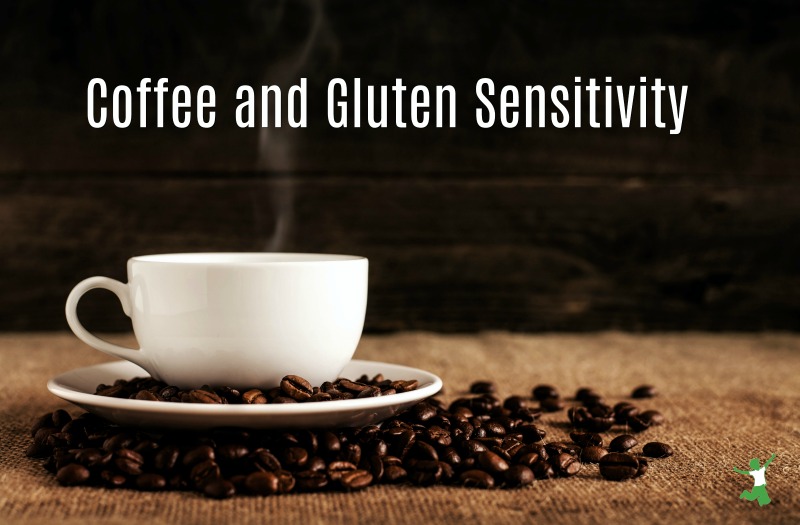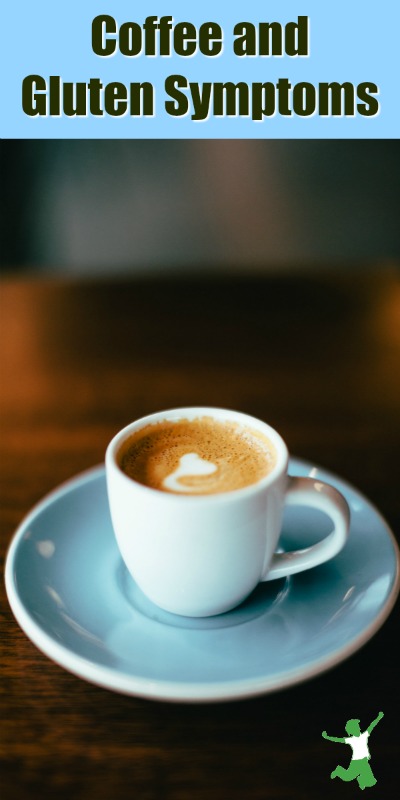Table of Contents[Hide][Show]
Coffee should be avoided by those who are Celiac and many who suffer from wheat sensitivity as it contains cross-reactive proteins to gluten.

If you drink coffee, even bulletproof coffee and have gluten sensitivity or celiac, you might want to sit down for this one.
There is a surprising connection between gluten and coffee that is by and large ignored by the health community. This revelation holds ramifications for other autoimmune disorders as well.
The problem has nothing to do with caffeine, so decaf coffee would be included in this discussion.
In a nutshell, fairly recent lab research has revealed that 10% of coffee is a protein that cross-reacts with gluten antibodies.
This means that if you are gluten sensitive or celiac and are avoiding gluten-containing grains or perhaps have even gone completely grain-free if you still drink coffee there is a strong likelihood that the protein in the coffee is triggering the very same gluten-related health problems you are trying to avoid.
In other words, even if you think you are doing fine with your current gluten-free diet, it is very possible that skipping the coffee could take your health to the next level.
Symptoms of Gluten Sensitivity
Most people who are gluten sensitive don’t realize it because gastrointestinal problems like burping, gas, tummy upset, or toilet issues are the least common way for gluten issues to present themselves!
The most common symptoms of gluten sensitivity?
Migraines and other neurological issues – even MS!
Hormone and endocrine problems are another common way for gluten issues to manifest themselves.
How Coffee Triggers Gluten Sensitivity
So what exactly happens when a gluten sensitive person eats gluten?
Folks with gluten antibodies react to any gluten in the diet by mounting an immune response. This means that gluten is perceived by the body as an invader and the gluten antibodies attack the gluten itself trying to destroy it. This gluten attack is an inflammatory response and inflammation issues can occur anywhere in the body in any tissue or organ.
Here’s the real shocker I came across when researching the coffee/gluten connection:
According to Dr. David Clark DC, functional neurologist and endocrinologist:
There’s not a disease or health condition you can think of that does not have an association – in the research literature – with gluten sensitivity.
That’s a very strong statement!
In essence then, if you are gluten sensitive in any way shape or form, and it seems that most people are whether they know it or not given the epidemic levels of autoimmune issues today, gluten antibodies have the potential to react to proteins in other foods as if they are gluten thereby triggering an immune and inflammatory response.
The protein in coffee is the most common cross-reactor for gluten. Because it is the protein in the coffee that is the trigger, switching to decaf coffee does not solve the problem. Apparently, instant coffee is the worst offender.
Is it possible to be gluten sensitive and not cross-react to coffee? Yes, it’s possible but you’ll have to do some expensive lab testing with a knowledgeable doctor to find out.

Reference
Journal of Food and Nutrition Sciences
More Information
You Probably Need to Change WHEN You Drink Coffee
Coffee Enema
Morning Coffee Fix
Caffeine and Chronic Back Pain
Healthy Coffee Substitutes








Huge bummer. As a person who lives with celiac, coffee has been the only thing I’ve dared to order if I find myself in a cafe or restaurant. Guess I can’t even have that treat any more. 🙁
I’m so glad I recently cut out coffee consumption at home, otherwise I would be a total wreck right now reading this!
I would imagine that tea is totally different than coffee, beans vs. leaves, but given they both have caffeine I’m wondering if the proteins would be similar also. Do you know if tea would be a likely problem also?
Tea is not cross reactive to gluten antibodies like coffee is from what I have read.
Thanks so much for the information. But I’m also very sad. 🙁 Coffee is one of the great pleasures in my life, I look forward to my cup every morning. I am gluten/wheat sensitive though and although I have been strict with my diet I find my symptoms creeping back. Headaches, constipation, itching and rashes, and insomnia. The insomnia is getting especially hard to take, I only sleep 2-4 hours most nights despite the fact that I only drink coffee before 10 in the morning, eat a good traditional diet, exercise regularly, supplement with cod liver oil and magnesium soaks and supplements, keep a regular schedule, destress my life as much as possible, etc etc etc. Sigh, I guess I’ll have to cut out coffee now also.
Tina, a lot of times, people who have gluten intolerance will cut out gluten and increase the other foods that are most likely to be reactive–such as eggs and dairy–either to eat as themselves or to use in gluten-free, grain-focused baking and cooking. (Gluten-free recipes tend to use a lot of those.) Given your list of symptoms, you may want to take a couple of months to do an elimination diet to figure out what else is bothering you.
I agree. I found out through a traditional allergy doctor that I have several food allergies, and one of those is rice. So I gave up wheat and switched to rice as most people do…..I was still having migraines and was sick and lost at that point of what to even eat. I think the gluten messes with your stomach and causes the food allergies. Everyone should be food-allergy tested if you have stomach issues. The weight just started dropping off me too, so that was a big plus.
I suppose that if we didn’t have such issues with gluten that our bodies would be able to handle the coffee. Too bad all of that hybridization happened to wheat to make it so….well…..crappy! I LOVE my morning Joe. Sigh!
It’s seems these reactions are exacerbated when the body is in a state of low blood sugar. I’ve known one person (celiacs) who can’t drink it unless she has had a meal or drinks it with a liberal amount of sugar and cream.
I’m not celiac, but I have the same theory based on my personal experiences.
Thanks for the reality check, Sarah 🙁 I’ve known this for awhile now (Dr. Tom O’Bryan mentioned it on a podcast), and even tested sensitive for coffee and wheat on an MRT test (okay with caffeine and tea, though). Guess it’s finally time to give up my daily homemade coconut chai latte in favor of some herbal tea…Maybe that will be the missing link to help calm the remaining inflammation and joint pain from 35 years of rheumatoid arthritis!
Oh man 🙁 This stinks haha!! Do you have links to the research, it would be interesting to read?
I am gluten intolerant and I didn’t know this! I was drinking Decaf and thought it was okay but I couldn’t figure out why I was feeling the same as on regular coffee. Enterolab does stool testing for gluten intolerance that is a little pricey but all worth it. People who don’t exhibit extreme Celiac’s symptoms can still be tested for gliadin response which indicates a gluten intolerance. I would not do saliva tests because these don’t test what is in your intestines where most of the response occurs (I wasted my money on that one). Thanks for the info… time to give up my morning decaf!
Thanks for this information! I had *no* idea. A once a week decaf coffee sans sugar is my treat. Since I have a long history of migraines I’m thinking I may not be helping myself!
Coffee is very high in magnesium… magnesium treats migraines… I call bogus on a lot of these “facts” in the blog post.
Coffee is also very high in amines, a known migraine trigger.
Coffee is very high in potassium (not magnesium) . Potassium very alkalizing but too much potassium ultimately leaches leaches Calcium and Magnesium from the body. It is the potassium which gives the relief initially.
Caffeine is a trigger for migraines
Caffeine also treats migraines. Go figure.
Depressing!
Totally agree……..
Read Dr. Ray Peats work and be happy again. Coffee with sugar is very pro-thyroid.
Yeah right! I’m a huge coffee lover and my thyroid is dead!
Okay, okay, bou have to also factor in the number of people who are still alive, simply because I drank my coffee in the morning before having to deal with them!!!!! You don’t think THAT’s a health issue?
BUT… now that I’ve discovered how Roasted Mesquite beans (a) taste better than coffee, (b) deliver more caffeine; and (c) there are no know side-effects (there being no studies done yet), I think I’m safe until the studies come in!!!
AND since I own about 90 acres covered with Mesquite trees, I’m rich!!!!! Will never have to buy coffee again!
Okay, Angus. You have me intrigued! Please tell me more about roasted mesquite beans … do you make them into a “coffee” ground or just eat the beans? I’ve Googled them, but I’d like to know your experiences with them.
Thanks!
How much for 90 acres of mesquite trees?
I want a farm.
Angus, what is the process for harvesting and roasting mesquite beans? I would love to be able to do something besides rake them up and compost them every year! 🙂
Everything kills you
It is all starting to make sense now. In college I drank coffee (with a lot of cream and sugar… ugh) and would always end up with gastro issues a few hours later. I thought it was the caffeine… as I was also jittery and shaky after drinking it, too. I could drink black tea, and though I would still be jittery and shaky afterward, I wouldn’t have the gastro issues. I bet it was the COFFEE, not the caffeine that caused it! Unbelievable. Thanks for sharing! xoxo
All grains have a type of gluten in them. It is not just coffee and what they say is gluten.
It is only instant coffee! NOT espresso, And there are many other foods that cross react too, including caseine. So instant coffee with milk is the worst.
I did a post on all the cross-reactive foods for those with celiac here. http://paleozonenutrition.com/2013/05/13/non-responsive-and-refractory-celiac-disease-study-a-paleo-type-diet-gives-100-remission-for-most/
Actually, it’s not just instant. Please see the followup post I did with information from Nora Gedgaudas who is very knowledgeable on this subject.
Well – it just doesn’t show on the graph – 3 types of espresso coffee were tested with zero cross reactivity. Caseine is far worse, and instant of both types reacted
After reading the comments in these threads I stopped drinking coffee altogether. Within a few days, I am beginning to feel some relief from my neuropathic symptoms. Thanks for sharing
Is this research still relevant?